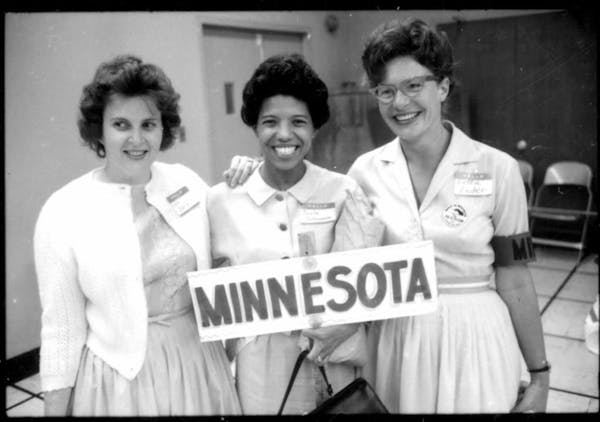An early afternoon gathering filled with tears and anger morphed into a second Saturday protest featuring optimism and a call to action.
Diverse crowds of several hundred people each gathered in downtown Minneapolis for two back-to-back protests calling for an end to police brutality and racism.
The first, the International Solidarity Day of Protest Against Police Terror, was organized by Black Lives Matter and other groups. It began at 1 p.m. outside the Hennepin County Government Center, with participants later marching to the barricaded First Precinct police headquarters at 19 N. 4th St. to denounce police in speeches and chants.
The second, on the plaza between U.S. Bank Stadium and the nearby light-rail station, sought to inspire the crowd to take action every day to stamp out inequity. Organizers promised fireworks and food trucks at the end of a march expected to wind down sometime after 9 p.m.
Protests have become daily occurrences in the Twin Cities, as well as nationwide and even globally, since George Floyd's May 25 death under the knee of Minneapolis police officer Derek Chauvin, captured on video by a bystander.
At the first event, a peaceful, racially diverse crowd of 400 to 500 people, most of them young and most wearing masks, listened to speakers and chanted. Homemade signs carried now-familiar pleas — "No justice, no peace" and "I can't breathe," along with messages such as "Free-ish since 1865" and "Think about how many weren't filmed."
"I'm a young black girl born into a system in this world that is ... " said speaker Hayat Kabeto of St. Paul, her voice breaking with emotion.
"We got your back!" the crowd chanted supportively.
" ... that is nothing but built against me," Kabeto said after a pause to gain her composure.
In school, she said, she was taught "I could be whatever I wanted — as long as the white man agreed."
Speaker D.J. Hooker of Minneapolis, who was wearing a Spiderman suit, said he believes that systemic change must come from the local citizenry.
"All change starts at the local level," he said.
The community most affected by police violence should control the plan to change the way public safety is handled, Hooker said.
Replacing some police with social workers, which some have suggested, wouldn't necessarily end systemic racism, he said.
"Social workers also discriminate," he said. "They're another tool the system uses against people of color. ... Cops without guns, right?"
Touissant Morrison of Minneapolis told the crowd that his city "is one of the most racist in the country." Racists in the South may wave Confederate flags, he said, but Minnesotans "have to look in their pockets, because there might be a Confederate flag in there."
As a professional working in schools mediating disputes between students and teachers, Morrison said, he has seen students of color disciplined or labeled with behavioral disorders "because they talked back to their teacher."
"Your rage is not a disorder," he told the crowd. "It's justified."
Outside the First Precinct, emotions intensified, but the crowd stayed peaceful.
In front of the concrete barriers outside the headquarters, they shouted their opposition to police tactics and called for the immediate firing of controversial Minneapolis Police Federation president Bob Kroll.
At 4 p.m. near U.S. Bank Stadium, an event sponsored by the 10K Foundation also drew several hundred people.
Organizer Tyo Daniel was encouraged by the enthusiastic and multiracial crowd.
"I'm getting hope from this crowd. People are coming together and they understand that, you know, the hype is over, but they still want to make sure that we're being heard and that their voices are heard," he said.
He also urged the crowd to do more than protest.
"What they can do is to educate themselves, and use their voice, use their network, use their talents and their abilities and do something," Daniel said. "Doing nothing is the problem. So many people are doing nothing."
Like the earlier protesters, the second marched through downtown streets on the mild spring night, many singing songs with themes of freedom.
katy.read@startribune.com
612-673-4583
james.walsh@startribune.com
612-673-7428

Want to share info with the Star Tribune? How to do it securely

'Safe recovery sites' would offer syringes, naloxone and more to people using drugs. The plan could be in peril.
New Minnesota GOP leaders seek peace with party's anti-establishment wing

Who is Republican Lisa Demuth, Minnesota's first House speaker of color?

